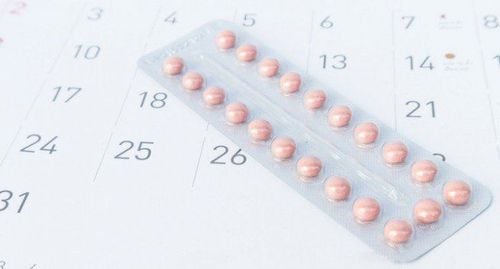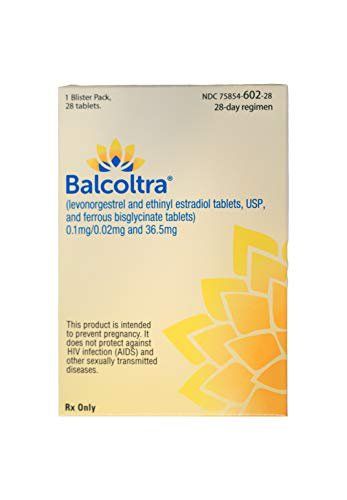This is an automatically translated article.
Zenchent is a combination hormone medicine used to prevent pregnancy. With 2 hormones: progestin and estrogen, Zenchent helps prevent pregnancy effectively, and helps regulate menstruation, reduce acne, reduce the risk of ovarian cysts...
1. What is Zenchent?
Zenchent is a combined oral contraceptive that works by inhibiting ovulation, increasing cervical mucus (which makes it difficult for sperm to enter the uterus) and decreasing the thickness of the lining of the uterus (reducing the chance of an egg being implanted). implantation insemination).
In addition to the use of birth control, Zenchent drugs also have auxiliary effects such as:
Regulate menstruation (reduce blood loss and menstrual pain); Treatment of acne ; Reduce the risk of ovarian cysts. However, using Zenchent does not protect users and their partners from sexually transmitted diseases such as HIV, gonorrhea, and Chlamydia. Therefore, users should consider using other measures (condoms) to protect their health.
2. Instructions on how to take Zenchent
Zenchent is to be taken by mouth as directed by your doctor, usually once a day. Choose a certain time frame that is easy for you to remember to maintain the daily habit of taking your medicine.
A pack of Zenchent pills usually contains 21 active pills, to prevent pregnancy, you take 1 pill per day for 21 consecutive days. Usually you will get your period in the 4th week of your cycle.
And if you are taking a blister pack with 28 tablets (as above but with 7 more reminder tablets (without hormones)). The way to use is the same as above, after 21 days of taking the active drug, continue to take 7 inactive tablets with a dose of 1 tablet / day. Once used up, start a new pack the next day regardless of whether you have your period or not. If you still don't get your period, see your doctor and ask for advice.
* Note:
It is very important to continue taking this medication exactly as prescribed by your doctor. With certain brands of birth control pills, the amount of estrogen and progestin in each pill will vary from time to time in your cycle. Therefore, you must follow the instructions to find the first pill, starting with the first pill in the pack and taking it in the correct order. To prevent pregnancy, you must not skip or forget any doses; Vomiting or diarrhea may prevent Zenchent from being effective as a contraceptive. Therefore, if you experience vomiting or diarrhea, you should consider using a backup birth control method (eg, condoms, spermicide); If you are prone to stomach upset or nausea while taking the medicine, it is recommended to take Zenchent after the evening meal or before going to bed. However, no matter what dosing schedule you follow, it is very important that you take this medicine at the same time every day, 24 hours apart; If this is your first time using this medicine and you are not switching from another form of hormonal birth control (eg patch, other birth control pill), take the first pill in the pack on the first Sunday after at the start of your period or on the first day of your period. If your period starts on a Sunday, start taking this pill on that day. For first cycle only, in combination with a non-hormonal form of birth control (eg condoms, spermicide) for the first 7 days to prevent pregnancy until the pill has had enough time to work. use. If you start taking the pill on the first day of your period, you don't need to use backup birth control for the first week.
3. Side effects of Zenchent
Women who take birth control with Zenchent may experience some side effects including:
Nausea, vomiting; Headache ; Full stomach; Chest tightness; Swollen ankles and feet (signs of water retention); Weight change; Hypertension ; Vaginal bleeding (spotting) between periods; Menstrual delay, irregular menstruation; If you miss your period 2 times in a row (or 1 period if you haven't taken your pills correctly), contact your doctor to find out the cause and determine if you are pregnant.
4. Notes when using Zenchent
Before using Zenchent, users should talk to their doctor about the benefits and risks of taking birth control pills. If you have health problems tell your doctor if you:
Have a blood clot in your legs, eyes, or lungs; Have a clotting disorder (eg, protein C or protein S deficiency); High Blood Pressure ; Abnormal breast exam; Cancer (especially endometrial or breast cancer); High cholesterol or triglyceride levels (blood fats); Depression; Diabetes; You and your family have a history of a swelling disorder (angioedema); Gallbladder problems; Severe headache (migraine); Heart problems (such as heart valve disease, irregular heartbeat, history of previous heart attack); History of yellowing of the eyes or skin during pregnancy or when using hormonal contraceptives (such as pills, patches); kidney disease, liver disease (including tumors), stroke, swelling (edema); Have thyroid problems; Vaginal bleeding of unknown cause. Other notes:
If you have diabetes, Zenchent may affect your blood sugar. Check your blood sugar as often as directed and share the results with your doctor. Tell your doctor right away if you notice symptoms of high blood sugar such as increased thirst or urination. Your doctor may consider adjusting the dose of your diabetes medication, exercise program, or diet; It may take time for your body to regain the ability to get pregnant after you stop taking this medicine. Zenchent should not be used during pregnancy. If you become pregnant or suspect you may be pregnant, tell your doctor right away. If you just had a baby or had a miscarriage/abortion after the first 3 months, talk to your doctor about reliable forms of birth control and find out when it's safe to start using birth control contain the hormone estrogen, such as this one. Zenchent may decrease breast milk production. Small amounts pass into breast milk and may cause unwanted effects on a nursing infant. Consult your doctor before breast-feeding.
5. Interactions of Zenchent
Some drugs that can interact with Zenchent include: Aromatase inhibitors (such as Anastrozole, Exemestane), Ospemifene, Tamoxifen, Tizanidine, Tranexamic acid, certain combination products used to treat inflammation Chronic hepatitis C (Ombitasvir / Paritaprevir / Ritonavir).Some medications can make hormonal birth control less effective and can increase the risk of pregnancy. Examples: Griseofulvin, Modafinil, Rifamycin group drugs (such as Rifampin, Rifabutin), St. John's wort, drugs to treat seizures (such as Barbiturates, Carbamazepine, Felbamate, Phenytoin, Primidone, Topiramate), HIV medicines (such as Nelfinavir, Ritonavir, Nevirapine).
Zenchent drug can affect some tests such as: Tests for blood clotting factors, thyroid... may cause false test results. Therefore, it is important to make sure that laboratory staff and all doctors know you are using this medicine.
Please dial HOTLINE for more information or register for an appointment HERE. Download MyVinmec app to make appointments faster and to manage your bookings easily.













